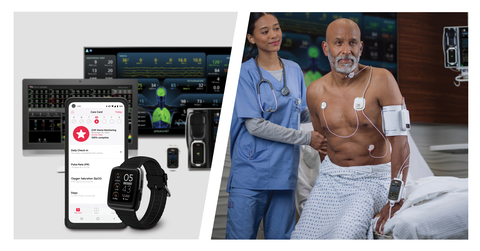Scope of the SESHAT Project at Pioneering Hospital, Part of the Catalan Health Institute, Includes Deployment of up to 1,000 Masimo W1 Watches, 100 Radius VSMs, and Numerous Additional Masimo Hospital Automation™ Solutions
BARCELONA, Spain–BUSINESS WIRE–
Masimo (NASDAQ: MASI) today announced that Germans Trias i Pujol, a pioneering hospital serving more than 800,000 people in north Barcelona, Spain, is launching a breakthrough telehealth and remote patient management initiative using Masimo technology. The SESHAT project is focused on using advanced wearable technologies and wireless connectivity to allow remote clinicians to keep track of patients’ physiological data in near real time wherever they are, whether the patient is in another part of the hospital or at home. The project, which began in the fourth quarter of 2023 and is slated to last at least three years, includes the implementation of up to 1,000 Masimo W1® medical watches, 100 Radius VSM™ Wearable Continuous Vital Signs Monitors, 10 Patient SafetyNet™ Systems, and a host of additional Masimo Hospital Automation™ products.
This press release features multimedia. View the full release here: https://www.businesswire.com/news/home/20240602519106/en/
 Joe Kiani, Founder and CEO of Masimo, said, “We are honored to partner with Germans Trias i Pujol to support the SESHAT project. When I founded Masimo 35 years ago, our mission was to improve patient outcomes and reduce the cost of care by taking noninvasive monitoring to new sites and applications. Now, with decades of innovation and refinement, we are bringing our pioneering accurate and continuous monitoring technologies to even more new sites and applications, including the home – with powerful wearable, tetherless, and remote modalities like Masimo SET®-based Masimo W1 and Radius VSM. Our breakthrough predictive algorithm Halo™, AI-powered tools, and connectivity and automation solutions in turn make that accurate, precise, rich stream of actionable patient data available to clinicians when and where they need it, helping patients feel connected and cared for, and informing evermore insightful decisions about care. Ultimately, we believe this will improve outcomes while reducing the cost of care, in keeping with our founding mission. We look forward to gleaning innumerable insights and improving 800,000 lives with the forward-thinking clinicians of Germans Trias i Pujol.”
Joe Kiani, Founder and CEO of Masimo, said, “We are honored to partner with Germans Trias i Pujol to support the SESHAT project. When I founded Masimo 35 years ago, our mission was to improve patient outcomes and reduce the cost of care by taking noninvasive monitoring to new sites and applications. Now, with decades of innovation and refinement, we are bringing our pioneering accurate and continuous monitoring technologies to even more new sites and applications, including the home – with powerful wearable, tetherless, and remote modalities like Masimo SET®-based Masimo W1 and Radius VSM. Our breakthrough predictive algorithm Halo™, AI-powered tools, and connectivity and automation solutions in turn make that accurate, precise, rich stream of actionable patient data available to clinicians when and where they need it, helping patients feel connected and cared for, and informing evermore insightful decisions about care. Ultimately, we believe this will improve outcomes while reducing the cost of care, in keeping with our founding mission. We look forward to gleaning innumerable insights and improving 800,000 lives with the forward-thinking clinicians of Germans Trias i Pujol.” Dr. Oriol Estrada, Director of Healthcare Strategy and Innovation at Germans Trias, commented, “Project SESHAT, named for the Egyptian goddess of writing and measurement, aims to transform healthcare from a reactive to a predictive model thanks to continuous and real-time reliable patient data measured through wearable technology, both in hospital and at home.”
The SESHAT project arose from needs identified during the COVID pandemic and centers on the remote monitoring of patients with complex care requirements. The project’s goal is to obtain real-time physiological data from patients and have that data help clinicians improve health outcomes. By facilitating better tracking of each patient’s physiological changes, and combining such changes with other available health data, SESHAT project clinicians hope to design and validate better prospective indicators of clinical progress and therapeutic adherence. Their goal is ultimately to help institutions transition from a reactive care model, in which healthcare teams treat symptomatic diseases, to a more proactive model in which teams receive information that enables them to anticipate complications or select more suitable medications to ensure a better therapeutic response, based on each patient’s profile.
“To achieve these objectives,” continued Dr. Estrada, “wearable technology that is robust, reliable, and does not hinder the patient’s normal life had to be selected. After analyzing various options, Masimo technology embedded in medical-grade wearable devices such as Masimo W1 and Radius VSM was chosen. A decisive factor in this choice was Masimo’s willingness to become a technological partner beyond just being a technology provider. We have established a strategic collaboration whereby the SESHAT project will serve as a validation field for technological improvements and identification of new needs in which both institutions will cooperate. When deciding, it was important for the project leaders to work with a leading company in the monitoring technology sector that offers a portfolio with a global solution for all phases of patient care: from the hospital to the home, while also providing integration with Hospital Information Systems.”
The Germans Trias i Pujol University Hospital of Badalona belongs to the Catalan Health Institute. It is a high-tech center that provides health services to a population of 800,000 inhabitants in the North Metropolitan area of Barcelona. Since its foundation, the hospital has been a pioneer in the development and care in various areas of excellence, such as infectious, cardiovascular, inflammatory, oncological, and respiratory diseases, among others. It encompasses a powerful biomedical research campus with 12 internationally renowned institutions, employing over 6,000 professionals and researchers in the field of health. Clinical innovation-transforming clinical problems into opportunities for improving outcomes-is one of the institution’s strategic pillars.
Halo is not FDA cleared and is not available in the U.S.







